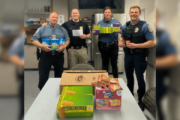ERIC OLSON
AP College Football Writer
LINCOLN, Neb. (AP) — Whenever they run into each other at a function for Heisman Trophy winners, Mike Rozier reminds Gino Torretta of their schools’ shared history.
“If you guys wouldn’t have beaten us,” the 1983 winner for Nebraska tells the 1992 winner for Miami, “you wouldn’t have went on the run you had. We put the Miami program on the map.”
Miami, in turn, did the same for Tom Osborne’s dominant Nebraska teams of the mid-1990s.
For two decades starting in the 1980s, the Hurricanes and Cornhuskers, along with Florida State, were the dominant programs in college football. Miami won 189 games and five national titles from 1983 to 2001, and the Huskers triumphed in 201 games and three titles.
The programs’ images couldn’t have been more in contrast. Miami, or “The U,” represented the glitz of the South Florida fast lane, and the Huskers the staid, hard-working life on the Plains.
Four of the last five times the teams played, all in bowls, the winner was crowned national champion. Many of the participants went on to illustrious NFL careers.
The stakes will be considerably lower when they meet Saturday night in Lincoln.
No. 24 Nebraska (3-0) hasn’t won a conference title since 1999 or played in a BCS game since it was a controversial pick to go to the 2002 Rose Bowl, where the Hurricanes won their last national title.
Unranked Miami (2-1) hasn’t won a conference championship or played in a BCS game since the 2003 season.
“There always is a cyclical ebb and flow to any athletic endeavor. You don’t stay on top forever,” said Osborne, who, as Nebraska’s athletic director, in 2009 set up the home-and-home series with the Hurricanes.
Big Red fans believe Miami’s visit is long overdue. In four of the last five games Nebraska had to play on the Hurricanes’ turf, the since-demolished Orange Bowl stadium. Osborne said Miami’s home-field advantage probably was worth seven to 10 points.
Nebraska fan Rick Rawley, 28, said his first football memory is watching Torretta and the Hurricanes whip Nebraska in the 1992 Orange Bowl and that a win Saturday would “mean the football world to me.”
“I am a season ticket-holder and split the tickets with my older brother,” Rawley tweeted in response to an Associated Press question about the importance of the game. “I have given up all my tickets to him just to avoid the possibility of not getting Miami in the hat pick.”
Fans over 40 will never forget the 1984 Orange Bowl. The Huskers’ “Scoring Explosion” team — led by Rozier, Turner Gill and Irving Fryar — drew Howard Schnellenberger’s upstart Hurricanes in a classic remembered for Osborne’s decision to go for a late two-point conversion, and the win, instead of kicking the tying extra point that would have secured his first national title.
Miami’s Ken Calhoun tipped away Gill’s pass to Jeff Smith, and the Hurricanes won 31-30. Folks in Nebraska still wear “Real Men Go For Two” T-shirts that show Osborne in his coaching headset.
“I don’t believe I would have done anything different,” Osborne, now 77, said.
Schnellenberger, 80, said that was the best game he was involved in during a pro- and college-coaching career that started in 1959.
“I eat breakfast with it and I eat dinner with it,” he said. “That game is proclaimed by some as the greatest ever played. Those are true words in my estimation. Coach Osborne did the wisest and strongest thing he could, and even though they didn’t win the game, they won a lot of pride and prestige.”
Offensive line coach Art Kehoe, who’s been on the staff of all five Miami title teams, said, “I still think it was the biggest win in the history of our program.”
Jimmy Johnson succeeded Schnellenberger and beat Nebraska 23-2 in the 1989 Orange Bowl, a victory that left Miami ranked No. 2 in the final polls. The Dennis Erickson-coached Hurricanes shut out the Huskers 22-0 in the ’92 Orange Bowl for the program’s second national title in three years and fourth overall.
Osborne recalled that the Huskers couldn’t handle the speed of Miami’s 4-3 defense. Those defeats, along with some heartbreakers to Oklahoma and Florida State, prompted Osborne to begin emphasizing the recruitment of better athletes and change Nebraska’s base defense from the 5-2 to 4-3 in 1993.
Nebraska finally broke through with a 24-17 victory in the ’95 Orange Bowl that provided Osborne with his elusive first title. The Huskers won that game thanks to a second-half comeback led by Tommie Frazier, who had battled blood clots most of the season.
The Huskers were just beginning their descent when the teams last met. Frank Solich’s Huskers started 2001 with 11 straight wins but lost 62-36 at Colorado in their final regular-season game. Few believed Nebraska deserved to play in the BCS championship game in the Rose Bowl, and Larry Coker-coached Miami won 37-14.
The effects of the firing of Solich after the 2003 season and the ill-conceived hiring of Bill Callahan are still felt in Lincoln, where Bo Pelini is in his seventh season.
Miami lost to Ohio State in the BCS title game after the 2002 season but by 2006 was out of the Top 25, not to appear again for three years. Later, the discovery of NCAA violations by a booster brought a self-imposed bowl ban, probation and other sanctions. Third-year coach Al Golden continues to pick up the pieces.
No matter, these proud programs cling to glory years that are becoming more distant. If for only three hours, they’ll re-live them Saturday night.
___
AP Sports Writer Tim Reynolds in Coral Gables, Florida, contributed to this report.
Copyright 2014 The Associated Press. All rights reserved. This material may not be published, broadcast, rewritten or redistributed.







